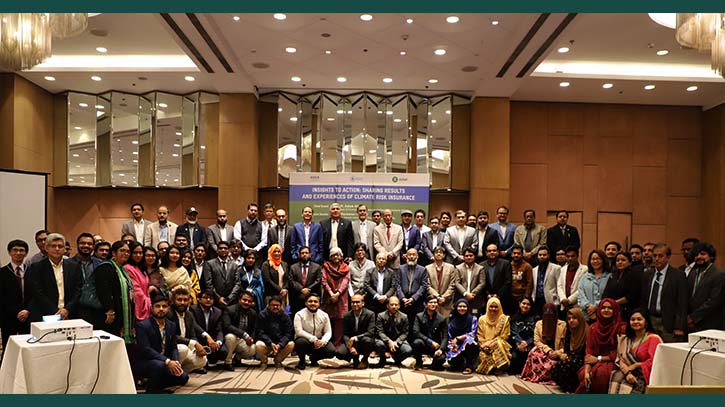
photo: Messenger
Economists, climate experts, financial experts and international organizations have called on the government to institutionalize Climate-Risk Insurance (CRI) as a critical tool to support disaster-prone farmers in Bangladesh, address the impacts of climate change, and secure livelihoods and national food security.
They made this call at an event titled ‘Insights to Action: Sharing Results and Experiences of Climate Risk Insurance (CRI),’ organized by Oxfam in Bangladesh and the World Food Programme (WFP) on Sunday at a hotel in in Dhaka. The event brought together all relevant stakeholders including government officials, financial institutions, privet sectors, climate experts, donors, partners to discuss the pressing challenges of climate change and how CRI can an effective way to address the challenges.
Bangladesh is the 7th most climate vulnerable countries in the world. The country ranked 84th out of 127 nations on the Global Hunger Index 2024. These climate challenges are severely impacting agriculture, undermining the nation's food security as well.
According to the keynote presentation of the event, the CRI is in important initiative to address the vulnerabilities of climate change. The project started in 2020 with the aim to providing flood index and weather index-based insurance to marginalized farmer households. Till now over 45,000 households (180,000 beneficiaries) are covered under this innovative risk transfer tool.
Joining as a chief guest, Dr. M. Aslam Alam, Chairman of Insurance Development and Regulatory Authority (IDRA) said, “Bangladesh is a climate vulnerable country, and we need to be innovative to address the challenges of climate change. The CIR project is a good example that has improved financial resilience against climate-related losses and ensured food security for the most vulnerable populations.”
“To promote CRI across the country, government need to take coordinated measures to nationalize this initiative in a favorable environment.,” he added.
Special guest Razwanur Rahman, Director General, Department of Disaster Management (DDM) focused on the disaster resilience for agriculture for ensuring food security. He encouraged on the integration of index-based climate risk insurance into national disaster risk management strategies and climate adaptation plans.
This national level event highlighted the current realities of climate change, milestones, successes, and transformative impacts of CRI project, which is collaboratively implanting by Oxfam in Bangladesh and WFP over the past five years with the support of Korea International Cooperation Agency (KOICA).
Junsu Kim, Deputy Country Director of Korea International Cooperation Agency (KOICA) took part as Special Guests, said, "Bangladesh stands at the frontline of climate change, enduring its harshest impacts. The CRI is not merely a financial tool—it’s a protection for farmers and a cornerstone of resilience.”
Riccardo Suppo, Head of Programme of WFP Bangladesh reflected, “CRI empowers vulnerable farming communities by providing timely financial support during climate shocks. This initiative reflects our commitment to building resilience, ensuring food security, and advancing equitable development in the face of growing climate challenges.”
Mahmuda Sultana, Acting Country Director of Oxfam in Bangladesh said; “CRI is more than an adaptation mechanism—it’s an investment in the people who sustain our food systems. Institutionalizing CRI requires coordinated efforts from all stakeholders, ensuring farmers can tackle climate impacts and secure their livelihoods for generations to come.”
The daylong event was concluded with some recommendations for advancing CRI in Bangladesh which include nationwide promotion, policy support for private sector involvement, platforms to encourage private investment in CRI products, and leveraging global climate finance for insurance premium support as an LDC.
Messenger/Tushar








